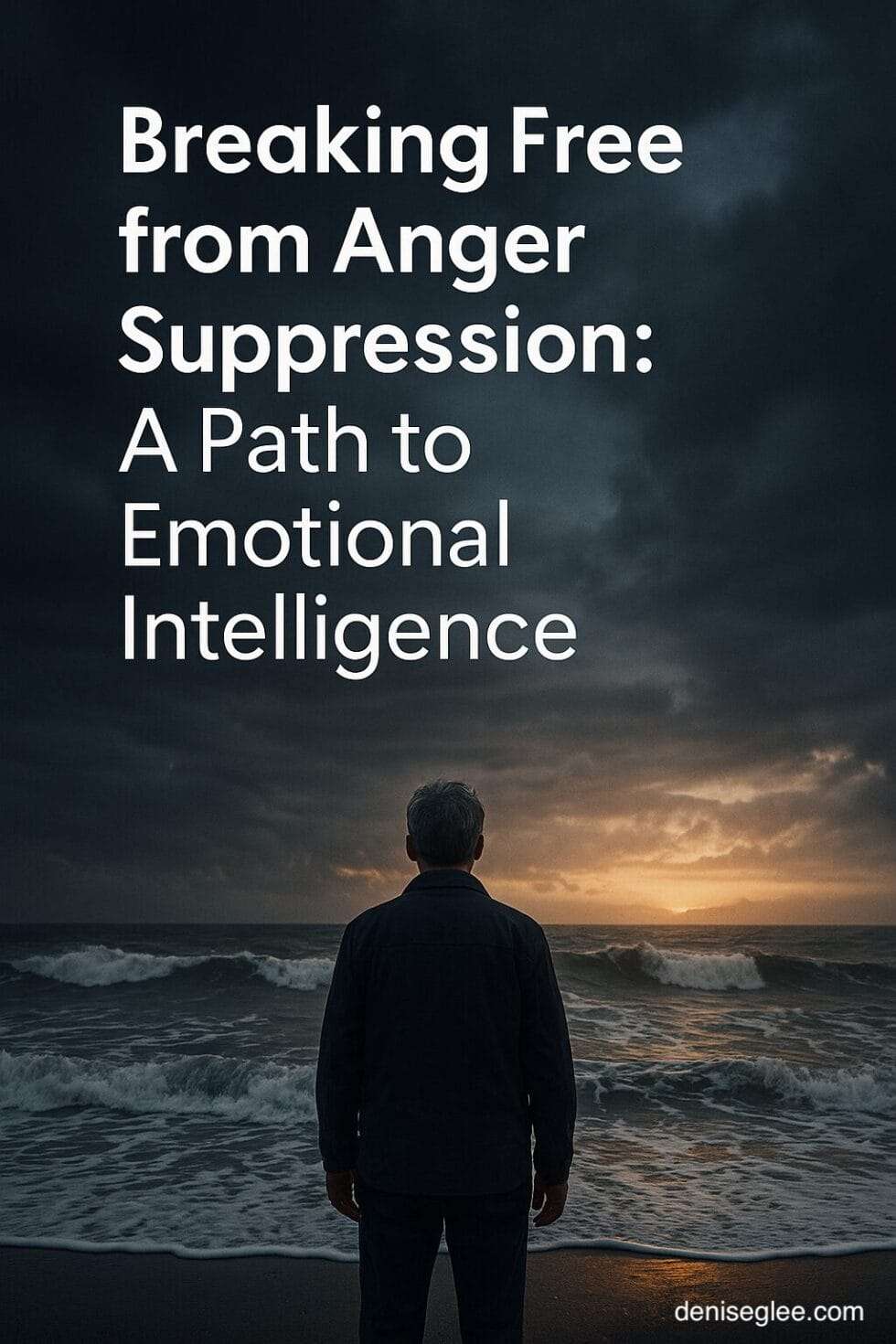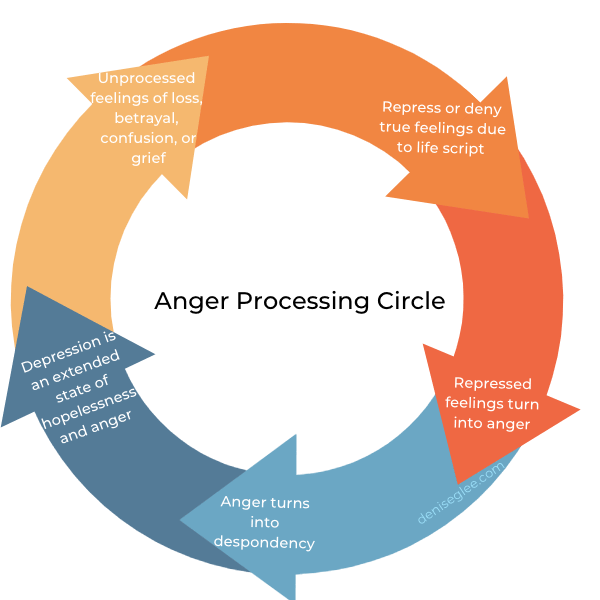
Breaking Free from Anger Suppression: A Path to Emotional Intelligence
- Updated: May 13, 2025
You’ve done the work.
You journaled. Prayed. Reflected. Stopped gaslighting yourself. You started to feel again. And now—out of nowhere—it’s here.
Anger.
Not just irritation. Not just stress. But that deep, shaking, “how-did-I-swallow-this-for-so-long” kind of fury.
The kind that scares you because you’ve been taught your whole life that anger is dangerous. Undignified. Unbecoming.
But here’s the truth most personal growth advice won’t tell you:
Anger is what shows up when your soul finally stops betraying itself.
This isn’t a setback. This is clarity.
You’re not regressing—you’re thawing. And what’s rising isn’t a problem to fix. It’s a message to hear.
If you’ve spent your life trying to be all things to all people—holding space for everyone’s needs but your own, minimizing your pain to keep the peace, staying silent so no one would leave or lash out—it makes perfect sense that your suppressed anger has been sitting underground like a live wire.
In this guide, we’re going to talk about:
Why anger suppression is so common (especially for high-functioning, emotionally responsible people)
The mental, physical, and spiritual cost of stuffing it down
And most importantly—how to harness that anger as fuel for emotional intelligence, boundary repair, and deep personal power
This isn’t about learning to “manage” your anger.
It’s about learning to listen to it.
Because when you stop fearing your anger, you can finally start trusting yourself.
Not all of us process anger in the same way. People with higher pain tolerances may go straight to despondency, while others may stew in sadness and become overwhelmed. Everyone handles pain differently.
Denise G. Lee Tweet
What Suppressed Anger Does to You—Even If You Don’t Notice It
Most people don’t even know they’re suppressing anger.
They just think they’re tired. Overwhelmed. Unmotivated.
Or they tell themselves they’re “being the bigger person,” “letting it go,” or “choosing peace.”
But here’s what’s actually happening behind the scenes—on a psychological and biological level—when you chronically suppress anger:
You’re not letting it go.
You’re pressurizing it.
And when that pressure builds, it follows a predictable pattern I call the Anger Processing Circle:

Unprocessed feelings of loss, betrayal, confusion, or grief
→ The raw material of your emotional pain—usually sparked by unmet needs, broken trust, or boundary violations.Repress or deny true feelings due to life script
→ You’ve been trained to minimize pain—especially anger. Maybe you were taught it was “unladylike,” “disrespectful,” or “dangerous.” So you stuff it.Repressed feelings turn into anger
→ Your body knows something is wrong. That internal dissonance fuels frustration, resentment, and internal heat—even if you’re still smiling on the outside.Anger turns into despondency
→ You don’t blow up—you shut down. You start feeling numb. Empty. Disconnected. Like everything takes too much effort.Despondency becomes depression
→ Left unresolved, the cycle settles into chronic low energy, hopelessness, addictive behavior, self-sabotage, or high-functioning despair.
And the worst part? Because this all happens quietly and socially acceptably, no one thinks anything is wrong.
You just look like a tired parent. A responsible team member. A quiet friend.
But inside, you’re living with pressurized rage—and it’s exhausting you.
How Suppressed Anger Shows Up in Real Life
When people think of “anger issues,” they picture shouting. Slamming doors. Explosions.
But the truth? Most people—especially high-functioning, emotionally responsible women—don’t explode.
They implode.
Anger suppression doesn’t just live in your head. It shows up in your body, your relationships, your business, and your energy—in ways that are so normalized, you might miss them.
Here’s how I know:

1. You’re always tired—even after resting.
That’s not burnout from work. That’s emotional exhaustion from stuffing every feeling that made someone else uncomfortable.
You’re not lazy. You’re running an internal suppression campaign 24/7. That takes energy.
2. Your body’s holding the truth—even if you’re not.
In my late 20s, I looked at an old driver’s license photo and realized one of my shoulders was visibly higher than the other.
I wasn’t in a car accident. I wasn’t lifting weights.
I was carrying anger I didn’t even know I had.

Chronic muscle tension—especially in the jaw, shoulders, back, and neck—is one of the clearest signs your body is doing the screaming your mouth can’t.
3. You people-please until you silently resent everyone.
You smile. You serve. You say yes.
And then you seethe.
You find yourself snapping at your partner over dishes, or ghosting a friend without explanation. Not because you’re cruel—because you’re overcapacity and have nowhere safe to tell the truth.
4. You over-function to feel worthy.
You volunteer for everything. Carry emotional weight for others. Do more than you’re asked—because part of you believes if you do enough, you won’t be abandoned or criticized.
That drive often looks like ambition on the outside.
But it’s really grief with a productivity mask.
5. You either shut down… or you blow.
You might stay silent until something tiny tips the scale.
And then you lose it—and feel ashamed for hours or days afterward.
Or you don’t explode at all. You just go numb. Disassociate. Let life happen to you.
That isn’t emotional regulation. That’s emotional freeze.
If any of this sounds familiar, your anger isn’t the enemy. Suppression is.
And the good news? Once you can name what it’s doing to you—you can start changing what it does for you.
How to Harness Your Anger Without Hurting Yourself (or Anyone Else)
Let’s be clear: anger doesn’t make you dangerous.
Unacknowledged anger does.
If you’ve been suppressing your anger for years—or decades—you might be afraid that letting it surface will turn you into someone you don’t recognize. But the goal isn’t to act on it blindly. It’s to listen to it cleanly.
When you harness anger with emotional intelligence, it becomes a guide—not a grenade.
Here’s how to start:

1. Don’t try to explain it away. Let it speak first.
Most people try to narrate their anger before they even feel it:
“I’m just tired.”
“It’s not a big deal.”
“They didn’t mean to.”
Stop. Let the feeling have its full say. Anger is data. It tells you where something inside you is being crossed, dismissed, or disrespected.
2. Channel it somewhere physical before it leaks somewhere emotional.
Anger builds up in the body. If you don’t discharge it intentionally, it seeps into your tone, your sarcasm, your silence.
Try:
Walking with no headphones
Hitting a pillow
Boxing drills, weighted squats, or screaming in your car
It doesn’t have to be pretty. It has to be real.
3. Ask: What is this anger protecting?
Anger often sits on top of grief. Shame. Loneliness. Fear of abandonment.
Once it cools just enough, go underneath it.
Ask:
What felt violated?
What am I afraid will happen again?
What would I say if I didn’t care how it landed?
This is where anger becomes emotional intelligence: when it connects you to your truth, not just your fire.
4. Speak from it—don’t speak as it.
There’s a difference between saying:
→ “You never listen to me!”
…and:
→ “I’m angry because I keep shrinking my needs to avoid conflict.”
The first is heat.
The second is clarity with boundaries.
You don’t have to be soft to be safe. You just have to be honest and regulated.
5. Let anger inform your action—not replace it.
Your anger might tell you it’s time to leave. Set a boundary. Speak up. Stop over-functioning.
Good.
Just let your discernment decide how and when.
The goal isn’t to suppress anger or explode with it.
It’s to let it move through you—so it can teach you, guide you, and clear space for something new.
Still Unsure About Your Anger? You’re Not Alone
A: You’ve already been controlling it—by stuffing it. What you’re learning now is how to feel it with skill. Emotional intelligence means learning to ride the wave without being taken under. And that starts with awareness, not denial.
→ Related post: Why Real Leadership Begins with Emotional Sobriety
A: That’s more common than you think. Most suppressed anger starts as confusion or numbness. Instead of trying to name it perfectly, start by noticing where it lives in your body. The clarity will come when safety increases.
→ Related: The Silent Wound: Healing Childhood Emotional Neglect
A: By asking who that belief protected—and who it silenced. Anger isn’t immature. Suppressing it without questioning why is. You get to rewrite what safety, maturity, and leadership look like on your terms.
→ Also see: Emotional Intimacy Isn’t Just Sex or Oversharing—It’s a Learnable Skill
🧠 Final Thoughts
If you’re angry—good.
This is a sign you’re finally feeling what your body’s been holding for years.
A clue you’re not numb anymore. Not frozen. Not pretending.
It means something in you is waking up and saying:
“I can’t carry this like this anymore.”
You don’t have to suppress it.
Nor do you have to explode with it.
Actually, you can learn to trust it.
Because when you stop seeing your anger as a flaw to fix—and start seeing it as a force for freedom—you step into a version of emotional intelligence most people never touch.
You don’t have to stay stuck in silence.
You don’t have to keep swallowing your truth.
You’re allowed to burn through the old story—and build something honest from the ashes.
Go Further
If you’re ready to turn your anger into clarity—not chaos—I’d be honored to walk with you.
💛 Work with me, Denise G. Lee – Together, we’ll explore the suppressed emotions shaping your patterns and create a life built on truth, not tension.
👉 Start your healing journey
🎙️ Prefer to listen?
Tune into my podcast for real conversations on leadership, anger, boundaries, and what healing actually looks like.
👉 Introverted Entrepreneur – wherever you stream
💌 This hit something real? I’d love to hear from you.
👉 Write me a note
And just in case you need permission:
You don’t need to stay silent to stay safe.
Your voice matters.
Your anger has a purpose.
And you’re not crazy for feeling it.





